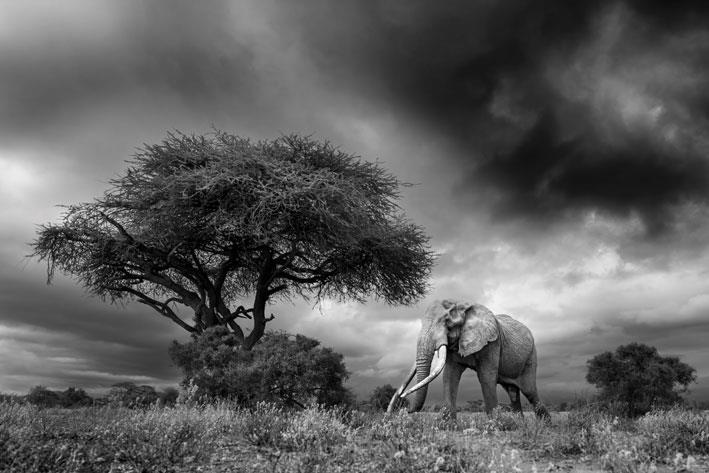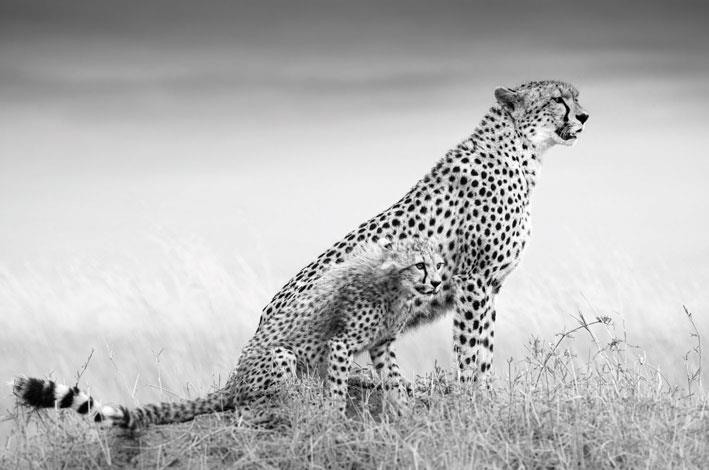Can you please introduce yourself to our readers?
I was born in a small town called Älvängen, Sweden, in 1977. As a child, I spent much of my time exploring the forests, watching animals, fishing, and developing a deep connection with nature. I was always fascinated by wild animals. This was way back before internet, cable TV, streaming and having everything at one's fingertips. I remember eagerly waiting for the weekly nature programme on Swedish television.
As I grew older, life took me in a different direction. I moved to Malta and built a career in graphic design, running my own design studio together with my wife. But everything changed when I got my first semi-professional camera. It reignited my passion for nature, and before long, I made the big decision to leave graphic design behind and pursue wildlife photography full-time. It was a leap of faith, but one that truly felt right.
Now, I have lived almost half of my 47-year-old life here in Malta. I am deeply rooted here and have no plans to leave. My wife is Maltese and I have two children.

What set you on the journey to becoming a photographer?
As mentioned above I was always interested in nature like most boys and girls growing up in the countryside in Sweden. Also, at the time there was nothing much to do for a young boy except being outdoors as soon as weather permitted. When growing up I became more and more interested in art and graphic design. Combining the two interests is a great recipe for a fine art wildlife photographer.
I bought my first ever semi-professional camera back in 2012 to bring with me on a life-long dream holiday - an African safari. This visit is what changed it all. When I returned to Malta I told my wife: "This is what I want to do." This is of course a very uncertain career choice but eventually I left graphic design and decided to go full-time on wildlife photography.

What formal training did you have as a photographer?
I have no formal training as a photographer to speak of. It is all trial and error, online tutorials, learning from others, being inspired by others and a lot of passion.

You seem to specialise in wild animals. Any particular reason for this?
Yes, I was always drawn to nature and animals from a young age. I was especially drawn to those iconic animals of Africa: lions, elephants, gorillas, zebras, giraffes. Other animals tickle my interest as well but it always tends to be the iconic animals of a certain place. I would love to photograph tigers in India or perhaps polar bears in the arctic for example.
When I was young it was just the actual animals but as you grow older you tend to widen your horizons a bit and you learn to appreciate the experiences and circumstances that surround these animals. Seeing them in their natural habitat and the fact that they are free and not in a cage is something that really inspires me in my work. The connection between the animals and the local population is also fascinating and often very different from how we interact and look at wild animals in our part of the world.
I am also aware of the fact that I am privileged to get to experience these animals in their right place and I almost feel an obligation to work hard to bring back the best possible work I can to tell their story. Most of these animals are on the decline due to human activities so they need all the help they can get.
I hope my work can bring just a little bit more awareness of these animals and their situation.

Do you have experience in portraiture, landscape photography, fashion photography?
I cannot say that I have any experience in these genres of photography unfortunately.

Have you done any photography in Malta at all and if so can you tell us something about it?
Yes, I have. During Covid, most of my regular work was put on hold or cancelled entirely. In addition to selling limited edition fine art prints, I also work as a photography guide on African safaris and other photography-based trips. But when the travel bans hit, that side of my work disappeared almost overnight. With international travel off the table, I decided to work locally. Something that I hadn't really done before in any professional manner. I decided to make a coffee-table book focusing on Malta's wild orchids (www.marvellousmalta.com). This was meant to be a series of books focusing on Maltese nature. This was in 2021 and a second book hasn't become a reality yet for various reasons but recently I have had an idea for the second book and who knows what the future holds.
Do you ever use drones for aerial photography?
In the national parks of Africa, where I do most of my work, drones are not allowed without a special permit. These permits are hard to get, costs a fortune and are often reserved for filming projects such as nature documentaries and such. Apart from this, I like to be as close as possible to the animals I work with and using the drone is totally the opposite.
Apart from the above, I "shoot for the wall", meaning my goal with photography is to create powerful, evocative prints that people want to showcase in their homes. Someone once said, "If you're going to photograph a beautiful model, you wouldn't stand 100 yards away" and I completely agree. I strive to get close, capturing intimate and compelling images that capture the attention of the viewer.
While I appreciate drone photography, I haven't yet found a way to make it align with my creative approach. That said, I've learned never to close any doors - so who knows? You might see me experimenting with drones in the future.
What tips would you give to someone just starting out in photography?
1. Photograph, photograph, photograph. Work that camera as much as you can. Practice makes perfect.
2. Look and be inspired by other photographers and not necessarily only those in your genre. You never know where you will find inspiration for your next work. Personally, I am particularly inspired by unposed lifestyle and documentary photography, especially in black and white.
3. Learn post processing properly. It is, and has always been a necessary part of photography. Many people tend to believe that back in the "good old days" post processing wasn't a thing. It definitely was. It just took longer and was a more tedious process
4. Most importantly: Choose a project, subject or genre you are passionate about. A lack of passion will show in your finished pieces.
How do you handle copyright issues when sharing images online?
When it comes to sharing my images online, I don't stress too much about copyright because my typical clients are individuals who appreciate the value of a signed piece, complete with an edition number and certificate of authenticity. For many of them, the artwork represents more than just decoration. They often collect for personal reasons or as an investment.
I also make sure not to share images online at a high enough resolution for large prints, simply to make it harder for anyone with bad intentions.
Just a few questions to get to know you better
What is it that you love doing most, apart from photography?
I am a very social person and I love spending time with friends and family. Either entertaining at home, meeting new people at a networking event or just meet up with friends somewhere. I also love to travel and see and experience new cultures (even without a camera).
What is it that annoys you and makes you lose your equilibrium?
Very few things actually annoy me, but I do get a bit unsettled when things don't work as they should or when people are consistently late. I also lose my equilibrium over injustices - whether they're small ones around me or larger ones on a bigger scale.
Out of all the countries you have visited which is your favourite?
Each country has its pros and cons, but there's a reason I keep coming back to Kenya. For what I'm looking for in a photography destination, it offers the perfect balance of untamed wilderness and the practicalities I need to work effectively, such as electricity, internet, food, etc. The people are also incredibly friendly and helpful. I recently visited Tanzania, which is quite similar. I have visited before but wasn't too impressed at the time, but this visit was amazing, and I'll definitely go back. If I have to say only one, it has to be Kenya.
Do you love music and if so, do you have any particular preferences?
I love listening to music every day while I work, but I'll admit, I'm not always sure what I'm listening to. I'm pretty much an omnivore when it comes to music, though I do have a few favourites - like Kings of Leon and Red Hot Chili Peppers.
When it comes to food, what do you like eating most?
This is a tough one. I'm definitely not a foodie and would probably be considered more of a meat-and-potatoes kind of person. I love a BBQ and red meat, but for sustainability and health reasons, I've cut back a lot in recent years and now eat more chicken. I'm also a big fan of Thai food. And I'll admit, I eat a lot with my eyes - if it doesn't look good, I have a hard time even touching it.
How would you spend an ideal day?
Apart from being in Africa with lions and elephants, on an ideal day at home I would wake up late (which somehow tends to be earlier and earlier the older I get), make pancakes for my children, if it is winter, a weekend and my wife lets me, I would love to watch some biathlon (a rather insignificant but very exciting winter sport) on TV for an hour or two. Then I would enjoy spending some quality time with the kids - anything really. Going out in nature, going shopping or just doing something together at home. I would finish off the day with a nice meal at a restaurant somewhere on the island.